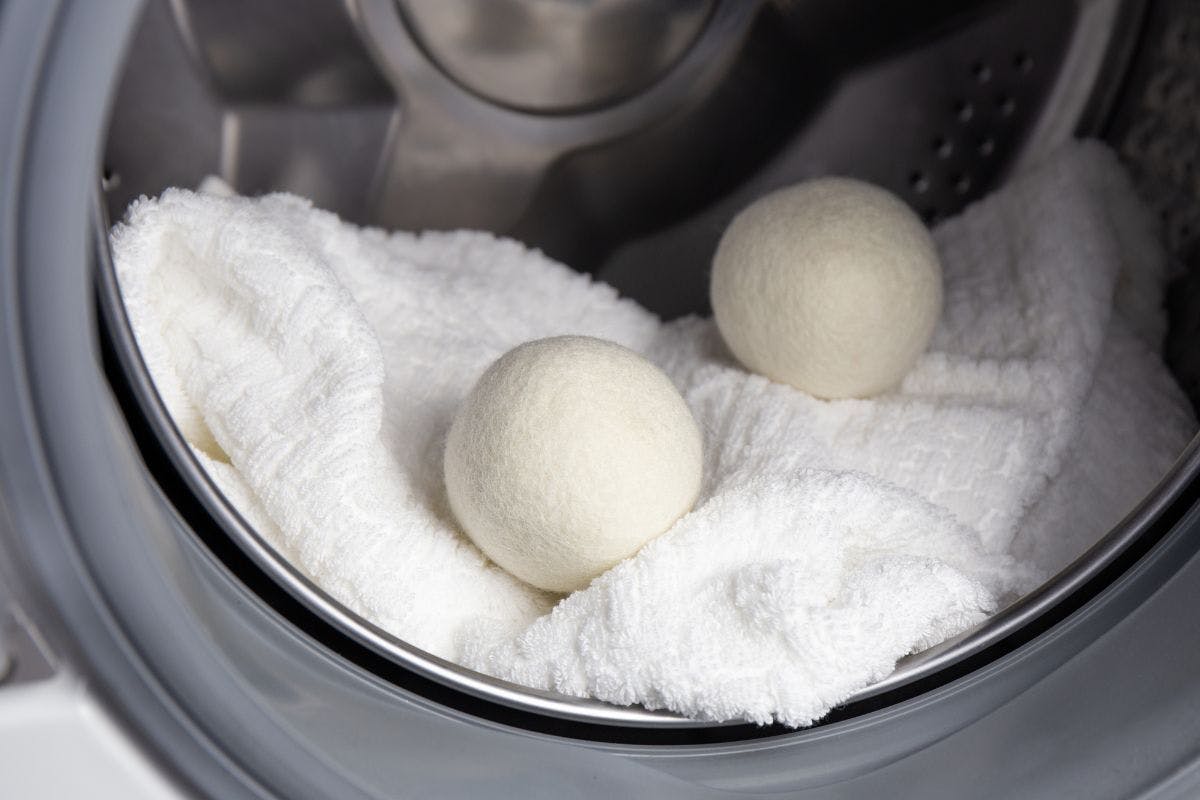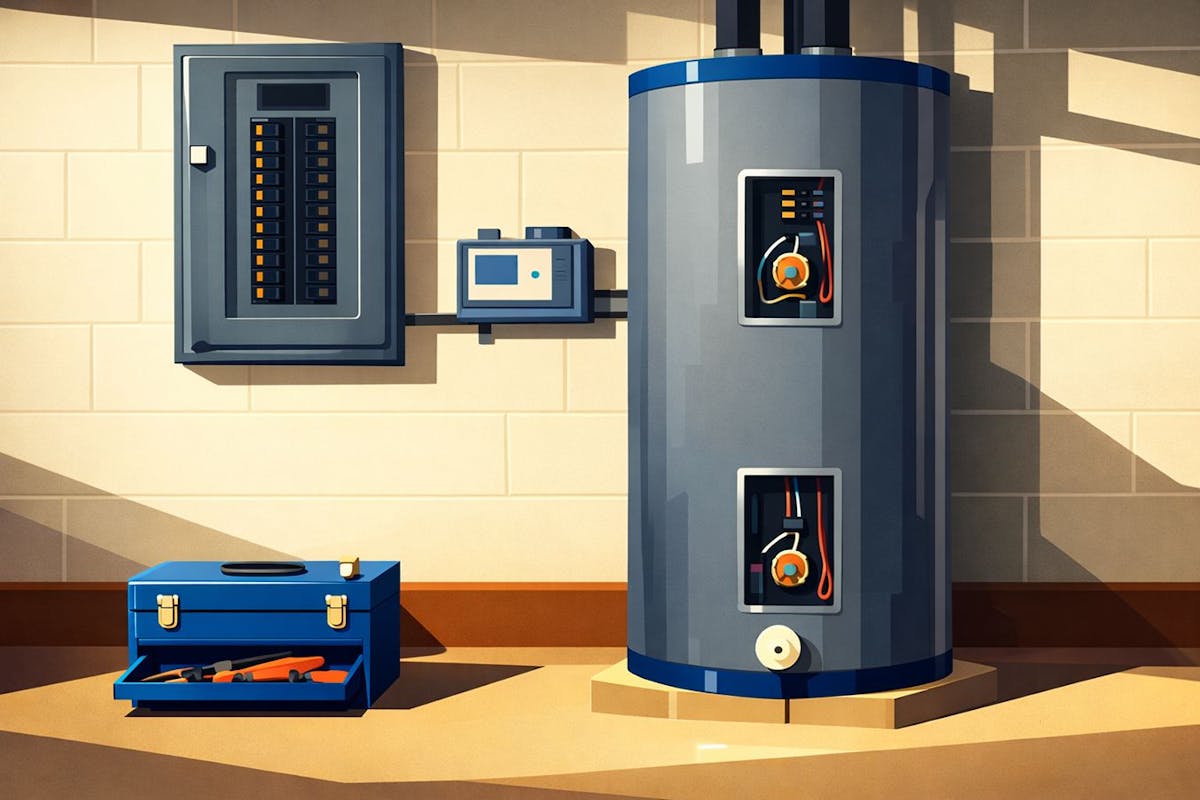Heat Pump Dryer Guide: Definition and Benefits
Last edited
Author
Andrew Giermak
Solar and Electrification Writer and Editor
Editor
Andrew Blok
Electrification and Solar Writer and Editor

When it came to drying your clothes, you used to have only three options: a gas dryer, a standard electric dryer, or a clothesline. Now, more efficient flavors of electric dryers are hitting the market.
Heat pump dryers are energy-efficient appliances that leverage the same heat pump technology that can heat and cool your home. Here's what you need to know about heat pump dryers.
See how much you can save with home energy changes
What’s a Heat Pump Dryer?
Heat pump dryers are a relatively new type of dryer, invented by a company in Switzerland in 1997 and sold for the first time in the U.S. in 2014. Heat pump dryers can be about 28% more energy efficient than standard dryers, according to Energy Star.
The appliance, in short, works as a self-contained system, recycling air repeatedly. Because heated air isn’t vented outside, the system is more efficient and adds less ambient heat to your home (also saving some HVAC energy and expense). It’s possible to install one in more locations in a home since no exterior vent is needed, and it can be easier on clothing and fabrics since it doesn’t get as hot as a standard dryer.
How Does a Heat Pump Dryer Work?
A standard dryer draws air in from outside the machine, heats it, and then vents the hot air, which has moisture in it, outside your house.
A heat pump dryer uses the same technology as an HVAC heat pump to remove moisture from a load of laundry. A heat pump moves thermal energy with a refrigerant and circulates warm air in a closed, self-contained system.
The key principle is that warm air holds more moisture than cold air.
Cool air passes over coils with pressurized refrigerant in them, which warms it up. Warm air goes into the dryer tumble and absorbs moisture as it passes through. After passing through a lint trap and filter, the air moves over cold coils, which suck the moisture out of the air like condensation on a glass of ice water. The moisture collects in a pan or runs out through a drainage tube. The cooler, drier air is ready to be heated again.
Heat Pump Dryer Pros
Heat pump dryers could be a good choice for you and your home for multiple reasons.
- Save money: Heat pump dryers can be up to 28% more energy efficient than standard dryers, according to Energy Star. Some companies tout 60% energy savings with their models. It’s also possible to see savings via knock-on effects such as more efficient HVAC usage and needing new clothes, sheets, and towels less often.
- No vents: Hot, humid air doesn’t have to leave the dryer, so there’s no vent and less ambient heat put out around the dryer. Eliminating a dryer’s exterior vent means one fewer hole for air to flow in and out of your home, too.
- Safety: No venting is a key part to heat pump dryers being less of a fire risk in your home. No vent means no lint or buildup, creating a potential flammable point.
- Flexibility: No vents means you don’t have to put your dryer in your laundry room along an exterior wall. It can go anywhere that’s most convenient. It may need a dedicated drain line.
- Smaller footprint: Most models are smaller than most conventional dryers and, along with not needing access to a vent, this means you can put one in spaces other than a laundry room.
- Easier on fabric: Heat pump dryers don’t get as hot as in a conventional dryer, which can increase the lifespan of clothes, towels, and sheets.
- Greener: Heat pump dryers use less energy. More positives for the environment include releasing less fabric and microplastic waste and reducing your need to buy new clothes and fabrics since they treat loads gentler.
See how much you can save with home energy changes
Heat Pump Dryer Cons
There are some reasons — from the initial expense to care and maintenance needs — why a heat pump dryer might not be your choice right now.
- Initial cost: A heat pump dryer is generally more expensive than a standard dryer.
- Load capacity: There are an increasing number of heat pump dryers with the same capacity as a standard conventional dryer, so this is becoming less of a problem. If you’ve got a big family with never-ending loads of laundry, factoring in capacity could be important. Running more loads may negate the energy savings you’re hoping for.
- Longer load times: Heat pump dryer cycles are typically longer than comparable cycles with standard dryers.
- Drip pan: If your model has a drip pan for the evaporating moisture, it must be emptied. Checking and cleaning it regularly is important to prevent mold or other messes.
Heat Pump Dryer Shopping Guidance
The features, pros, and cons of heat pump dryers can depend on the specifics you need. Some people might go with a heat pump dryer because they want a dryer to fit into a small space, with loads routinely being for one or two people. That equation probably won’t work for a large family with large laundry needs
Here are some specs and features you’ll likely want to consider.
- Energy efficiency: If you’re buying a heat pump dryer for energy savings, ensure you get one with the best efficiency marks. Energy Star lets you search heat pump dryers by Combined Energy Factor (CEF) and annual energy usage estimates.
The higher the CEF, the more efficient an appliance is. Conventional dryers with Energy Star certification have a CEF of 3.93 or higher, which means for every kilowatt-hour of energy used, 3.93 pounds of laundry is dried. Most Energy Star-certified heat pump dryers have a CEF of 8.0 or higher. The most efficient heat pump dryers on the market now have an 11.0 CEF. - Capacity and size: Again, this is in the eye, or home, of the beholder. You can pick a 3.6 cubic-foot heat pump dryer if you’re looking for a dryer for a small space. There are 7.4 cubic-foot heat pump dryers, too, the same size as a full-size conventional dryer.
- Smart connectivity: Many dryers are compatible with apps or some form of smart remote control. You can control a cycle to run when it’s very energy efficient — like while your home solar panels are generating electricity or during the utility company’s off-peak hours.
- Cycles: Most heat pump dryers now have all the special, even customizable, cycles of a full standard dryer. However, it’s still good to check if you’re looking for steam or delicate cycles.
- Noise: Most heat pump dryers will list their operating noise level. Find one that matches where you want to install it.
Rebates for Heat Pump Dryers
Heat pump dryers may be eligible for a home electrification and appliance rebate. The maximum allowed rebate for a heat pump dryer is $840. The rebate program is funded by the federal government but administered by the states, so whether a rebate is available to you and its value will depend on your state’s program, which will likely include income qualifications and other eligibility requirements.
You'll need to confirm eligibility requirements and availability with your state program.
Major Heat Pump Dryer Manufacturers
Energy Star-certified heat pump dryer models are available from brands including Asko, Beko, Blomberg, Bosch, GE, LG, Miele, Samsung, and Whirlpool.
Combining electric appliances with home solar panels for clean, renewable electricity could further improve your home’s energy consumption, independence, expenses, and environmental impact. If you want to know more about going solar, you can estimate your solar savings or learn what you can save with other home energy upgrades.
See what home electrification can do for you:
Frequently Asked Questions
What are the downsides of a heat pump dryer?
Potential drawbacks of a heat pump dryer include the initial purchase cost, the dryer’s capacity, and some additional maintenance or care needs compared to a conventional dryer.
What are the upsides of a heat pump dryer?
The pros of a heat pump dryer include energy and bill savings and the environmental benefits of using less energy. Heat pump dryers are also safer, can be installed in other places in a home because they need no vents, and are better for the lifespan and look of clothing and fabrics.
Are heat pump dryers as good as regular dryers?
Heat pump dryers are more energy efficient than standard, conventional dryers. A heat pump dryer might be a good fit for someone who wants to save money, electrify more or all of their home, or have a dryer somewhere other than the routine spot for a dryer.
What is home electrification?
Home electrification is the process of removing all uses of gas and other fossil fuels from your home and using electricity instead. If you have a gas-powered dryer, a heat pump dryer is one option to electrify your laundry room.
Disclaimer: This content is for educational purposes only. Palmetto does not provide tax, legal, or accounting advice. Please consult your own tax, legal, and accounting advisors.



